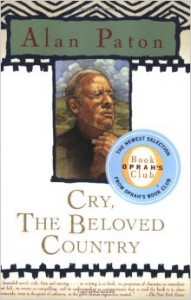As I was praying recently a certain heaviness descended upon me, maybe because of continuing events: the persecuted Church around the world, the pain of women and children suffering domestic violence, my own country’s indifference to asylum seekers – it was all so sad.
I recalled the scene which concludes Allan Paton’s majestic novel, ‘Cry the Beloved Country’: the tragic figure of the stricken father awaiting the dawn which would herald the execution of his son.
The father’s heartbreaking lament over his son and country is yet fused with the comfort of the coming of another dawn, for he is the impoverished Anglican priest of a rural African village. The father’s lament led me to write the following, drawing my own lament into a shared yearning for the new dawn:
The dawn will come
The Son of Man will come,
and we with Him
will bathe in a new dawn
the dawning of God’s rule on earth,
as it is in heaven.
Do you hear the cry: “Maranatha! Come Lord Jesus”?
Do you hear the martyr’s
final, “Oh, my Lord Jesus”?
Do you wait in this faith?
Do you await the coming of the Son
in glorious splendour,
the dawning of a new heaven and a new earth?
Oh, we await, with yearning
while working
with deep assurance,
for the dawn does come,
the Sun does rise
the Son did rise
the Son is risen
the Son will come again!
God the Father, ever watching,
ever yearning for wayward children to come on home.
God the Son, ever interceding,
expectant to the dawn of His coming again.
God the Holy Spirit, ever working,
preparing the world for the new dawn of the Son’s coming reign.
God, the Father, the Son and the Holy Spirit,
bless, guide and guard you,
this day, and every day. Amen.
Discomfort: Our current state. Comfort: New Dawn. The Comforter: The Holy Spirit who abides with us and indwells Christ’s people, comforting us, even in our discomfort.
(“Cry the Beloved Country: A story of comfort in desolation”. Allan Paton, (1944) Penquin Books, Ringwood Australia 1958, P236).
*See my earlier reflection on this same passage, Looking to our final emancipation
You can read my article here: Tasmanian Anglican


